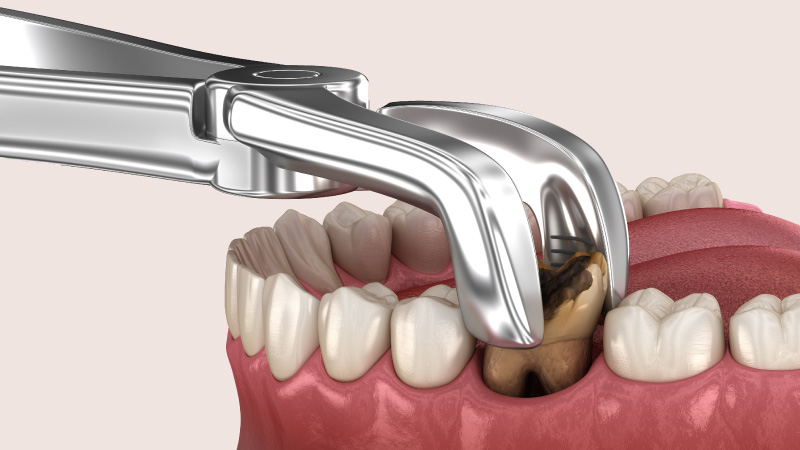Wisdom Tooth Extraction: Everything You Need to Know
Contents
One tooth that we are all familiar with, and mostly always associate with pain and extraction is the Wisdom Tooth.
Wisdom teeth or the third molars are the last teeth to erupt and this usually happens after you turn 18 years.
These wisdom teeth are considered vestigial and don’t really have any function to perform. Therefore, with time over generations, most people don’t even get all four of their wisdom teeth.

Most people face problems when their wisdom teeth start to erupt and this is due to the limited amount of space for it to fully come out.
Once we start feeling tooth pain, we have so many questions - what is the ideal wisdom tooth removal age? how much does wisdom tooth extraction cost?
Our search engine becomes all about ‘wisdom tooth extraction near me. What is the wisdom tooth extraction recovery period?
Through this blog, we plan to address a few of your concerns when it comes to wisdom tooth extraction.
When do Wisdom Teeth need to be Extracted?
Impacted teeth need to be extracted when they start affecting the health of the adjacent hard and soft tissues of the oral cavity.
Some instances of trouble include:
- Deep decay
- Severe pain
- Infection in the surrounding tissues
- Damage to the adjacent tooth and surrounding bone
- Food entrapment in the area
- Reduced mouth opening (trismus)
- Formation of a large fluid-filled sac around the impacted tooth (Cyst)
What Precautions should be taken before Tooth Extraction?
Both, safety measures before the extraction and wisdom tooth extraction aftercare are very important.
- The patient should be informed about the number of wisdom teeth that need to be extracted.
- An orthopantomogram or a CBCT may be required to assess the relationship of the lower wisdom teeth to the mandibular nerve. This is also necessary to examine the relationship of the upper third molars with the vital surrounding structures.
- If the patient has a pre-existing infection, they are advised to take an antibiotic and analgesic medication before the extraction of the tooth.
- If the patient has any existing co-morbidities, the oral surgeon requires clearance from the patient’s physician before the treatment procedure.
- The patient is advised to bring someone to the dental clinic on the day of the treatment.
Wisdom Tooth Extraction Procedure
The third molar extraction is usually an outpatient procedure. However, in certain cases where all four molars are to be extracted or the wisdom tooth is associated with a huge cyst, then it is done under general anaesthesia.
Step1: Administration of anaesthesia
The oral surgeon administers local anaesthesia near the tooth into the surrounding soft tissues. In the case of general anaesthesia, it is administered through the IV or via inhalation.
This inpatient procedure is usually done when there is a cyst in association with the third molar or if it is a complicated extraction procedure.
Step 2: Raising the flap
The oral surgeon provides an incision into the soft tissues if the wisdom tooth is partially impacted.
This helps to provide complete exposure to the crown of the tooth and facilitates easy extraction of the tooth.
Step 3: Bone Removal
Sometimes the surrounding bone may need to be drilled so that the crown of the third molar can be exposed and the instruments can be placed appropriately.
Step 4: Sectioning and tooth removal
The tooth may be divided into parts so that it can be easily removed from the socket.
Step 5: Cleaning and suturing of the socket
The socket is then cleaned thoroughly by the oral surgeon as it is important to remove any infectious soft tissue that may have been attached to the tooth. The flap is then sutured back into place.
Dos and Don’ts after Wisdom Tooth Extraction
The wisdom tooth extraction aftercare is very critical and must be adhered to.
Some side effects of wisdom tooth extraction may be faced, and the common ones are listed below.
- Post-operative bleeding may be seen after the extraction. However, if there are signs of prolonged bleeding the patient is advised to contact the dentist immediately.
- The post-wisdom tooth extraction pain can be dealt with using prescribed analgesics and antibiotics. These are prescribed by the dentist to prevent any secondary infection and manage post-wisdom tooth extraction pain.
- The patient is advised to do warm saline gargles and use chlorhexidine mouthwash to reduce the swelling and inflammation of the soft tissues and prevent any infections.
- The patient should avoid smoking and refrain from eating spicy or hot foods for the first few days after the extraction.
- Once complete healing has been achieved, the sutures are then removed.


